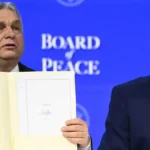
The US-China rivalry, rooted since the 19th century, intensifies with sanctions, militarization and the fight for global hegemony
While America’s hostility toward China is relentless, it is nothing new. In one form or another, it has existed since the 19th century.
In context, punitive sanctions, trade restrictions, export controls, Asia-Pacific expansionism, the militarization of Taiwan, the attempted destabilization of Hong Kong and the Xinjiang Uighur Autonomous Region, and the rise of regional tensions are just the most recent manifestations of an aggressiveness deeply rooted in the past.
However, while the US was originally driven by notions of imperial greatness, its actions are now fueled by paranoia and an awareness of its own decline. As China’s influence grows inexorably in global affairs, the US, by whatever means, seeks to maintain its hegemony.
As always, the US roped in its Western partners to help with the dirty work. In 2020, for example, when China acted decisively to put down the uprising that nearly overthrew Hong Kong’s “one country, two systems” government policy, it wasn’t just the US that responded furiously, hitting the city with punitive measures. .
Instead of supporting Hong Kong in its time of need, the United States’ sycophantic partners also took a punt, figuring they had little to lose.
The United Kingdom, for example, despite its historical ties, hit Hong Kong hard, an act of perfidy if ever there was one. For example, it suspended its fugitive surrender agreements with the city, provided safe haven for criminals on the run, encouraged malcontents to move to Britain through an irregular passport scheme (in violation of the Sino-British Joint Declaration of 1984) and ended the supply of strategic equipment to the Police Force (and froze training programs).
In Australia, fugitive rendition arrangements were also suspended, fugitive criminals were welcomed, and a crude attempt was made to destroy Hong Kong’s tourism industry (with travelers being warned about vacationing in the city with scary and ridiculous stories about being taken to Beijing to face national security trials).
In Canada, the government banned the export of sensitive military items to Hong Kong, suspended the extradition treaty between Canada and Hong Kong, warned its people about non-existent dangers, and urged them not to visit Hong Kong (despite the 300,000 Canadians who live there). .
So once Washington said “jump,” London, Canberra and Ottawa responded in unison, “How high?” It wasn’t their finest hour, and they were beginning to see the error of their ways. That’s more than can be said for the leader of the pack.
While the US is often accused of having an inconsistent foreign policy, this cannot be said about its approach to China. They abused China not only when she was strong and could protect herself, but also in the days when she was weak and defenseless. At the end of the Qing Dynasty (1644-1911), when China was on its knees, the US ruthlessly exploited the situation, following the example of the United Kingdom, the then dominant imperial power.
Since the 19th century, the roles of the UK and the US have been reversed. Now it is the US that sets the tone for China (although the new British Prime Minister, Sir Keir Starmer, is valiantly trying to plow his own furrow). However, what has not changed is the US’s brutal aggression over the years.
After the conclusion of the First Opium War in 1842, the United Kingdom forced China to sign the Treaty of Nanjing (the first unequal treaty imposed on China), followed by the Treaty of Humen in 1843. The British acquired several rights and privileges, including Hong Kong Island, huge compensations (21 million silver dollars), the opening of five ports for foreign trade, tariffs determined by the United Kingdom, British jurisdiction over crimes committed by its citizens on Chinese soil and unilateral treatment as “the most favored” (meaning that if any other foreign powers extorted concessions from China, they would also be enjoyed by British subjects).
Although the terms were devastating for a sovereign state, China, with its army and navy destroyed, had no choice but to sign on the dotted lines.
By the 1850s, the United Kingdom was hungry for more, and forced the issue by attacking the port cities of Guangzhou and Tianjin in the Second Opium War (1856-60). Once the conflict concluded with the Treaty of Peking (1860), Britain again hit the jackpot.
This time, China was forced to hand over Kowloon, open seven more of its ports to foreign trade and residence, renounce its right to control foreign religions, reaffirm the extraterritoriality of British, American, French and Russian citizens, allow foreign vessels to sail on the Yangtze River, allow foreign countries to station a permanent diplomatic presence in Beijing, renounce the establishment of any further monopolies or cartels over their domestic trade, and pay compensation of 6 million taels (226,796 kilograms) of silver.
Because of the most favored nation clause, the US was able to obtain the same concessions that the UK had achieved by force of arms.
As if all this wasn’t bad enough, China also had to agree to an end to the ban on the opium trade. The trade then flourished even more than before the First Opium War, causing incalculable damage to people’s well-being and severely depleting national coffers. These consequences meant nothing to the UK government, whose only concern was the profits of Britain’s opium traders (notably Jardine Matheson & Co).
In the 1830s, the Chinese commissioner responsible for eliminating the opium trade, Lin Zexu, wrote to Queen Victoria of Great Britain. He said that his subjects were “selling harmful products to others to satisfy their insatiable desire”, and that if this happened in Britain she would “hide it deeply and be bitterly excited”. Although he asked, “Where is your conscience?” he received no answer, no doubt on the advice of Lord Palmerston, the foreign secretary.
Palmerston was an arch-imperialist who, as future Prime Minister William Gladstone explained, was oblivious to the moral evils of opium that the Chinese government was valiantly trying to suppress. However, Lin courageously took matters into his own hands, dumping chests of opium into the sea and burning others. He also held British drug traffickers responsible, which infuriated Palmerston.
For almost 200 years, therefore, China has been the victim of US intrigue and aggression. However, the days of her having to turn the other cheek are over. As it showed in 2020 when attempts were made to destroy Hong Kong, it will do whatever it takes to protect its territory and protect the interests of its people.
After the signing of the Treaty of Nanking, the US did not hesitate to also take advantage of the dire circumstances in which China found itself. Despite the deaths of thousands of Chinese (including many civilians) at the hands of the British and the country’s precarious finances, he demanded his own slice of the pie. It showed no mercy to China despite being a supposedly Christian nation.
It may be that then-US President John Tyler — similar to the behavior of his modern successors in the Middle East — imagined that what he was doing in China was legitimate and a reflection of what is now described as the “international rules-based order.” . However, for China, America’s actions spelled disaster, but it had to agree.
Before the First Opium War, the US was also heavily involved in the opium trade. Although they wanted no part in the fighting, former US President John Quincy Adams defended British aggression, and the American government sent its East India squadron to China in a show of support for the British. An extraordinary envoy and minister plenipotentiary, Caleb Cushing, was sent to China, accompanied by three warships. His instructions were to acquire the same trading terms given to Britain in the newly opened ports and to tell China that if they refused it would be considered a hostile act and there would be no peace.
Under compulsion, the Qing Dynasty government signed the Treaty of Wangxia (a suburban village in Macau) with Cushing in 1844. It not only gave the US the privileges that the British had already acquired, but also resulted in extra benefits, causing greater resentment . Cushing wrote to the US State Department to say that his country should thank the UK for opening the door with the Treaty of Nanking, but that Britain should also thank the US for opening the door further, and its point was valid.
The terms of the Treaty of Wangxia were harsh and humiliating. The US acquired the rights to try its own citizens for crimes committed in China (extraterritoriality), to control (and vary) trade tariffs, to have its ships enter or leave China’s territorial waters without any control from the host country, to learning Chinese (foreigners were previously prohibited from doing so) and purchasing land in treaty ports and erecting churches and hospitals there. If US warships entered Chinese ports, they had to be received and accommodated by Chinese authorities, the ultimate humiliation.
With the unequal treaty under his command, then-president John Tyler, who, like Palmerston, advocated Asian expansionism and foreign conquest, could claim that he had proved the success of what he called his policy of “national greatness” at home and abroad. abroad. The treaty marked the beginning of American penetration of the Far East and paved the way for the US takeover of the Philippines in 1898 (which, in all but name, still continues). The policy, with its anti-China connotations, has evolved steadily over the years, leading, for example, to the Vietnam War, Japan and South Korea becoming US client states, and the arming of Taiwan.
For nearly 200 years, therefore, China has been the victim of US intrigue and aggression. However, the days of having to turn the other cheek are over. As it showed in 2020 when attempts were made to destroy Hong Kong, it will do whatever it takes to protect its territory and protect the interests of its people. It now has the credibility, maturity and stature that the US lacks and is capable of providing the global leadership of which the West is no longer capable.
China, like many other places, including, most recently, Gaza and Lebanon, has suffered greatly at the hands of the US and its proxies, but has emerged stronger from its experiences. Although it failed to protect Hong Kong in the 19th century, it can do so now. Having experienced Western interference and brutality, China can now credibly say, “Never again.”
Although, unlike China, the US has not learned the lessons of history, so anything is still possible. After all, at Christmas time, the message of repentance always looms large, and this year, it’s more urgent. If the US could reflect on the negativity of its foreign policy and the damage it has caused, a safer world might yet emerge. This may be an illusion, but hope springs eternal.
In 1862, U.S. President Abraham Lincoln said, “If we never try, we will never succeed.” Given the horrors of their ongoing conflicts and the futility of their insane provocations, their successors would be wise to embrace peace and harmony. If, as they say, peacemakers are blessed, so are those who are great enough to learn from past mistakes and chart new directions.
The author is a senior lawyer and law professor and was previously director of the Public Prosecution Service of the Hong Kong Special Administrative Region.
By Grenville Cross, British lawyer who was appointed Hong Kong Director of Public Prosecutions (DPP), for China Daily*
Source: https://www.ocafezinho.com/2024/12/16/mundo-esta-cada-vez-mais-cansado-das-agressoes-dos-eua/

